Top Candidate Screening Software: Best Tools for Applicant Screening
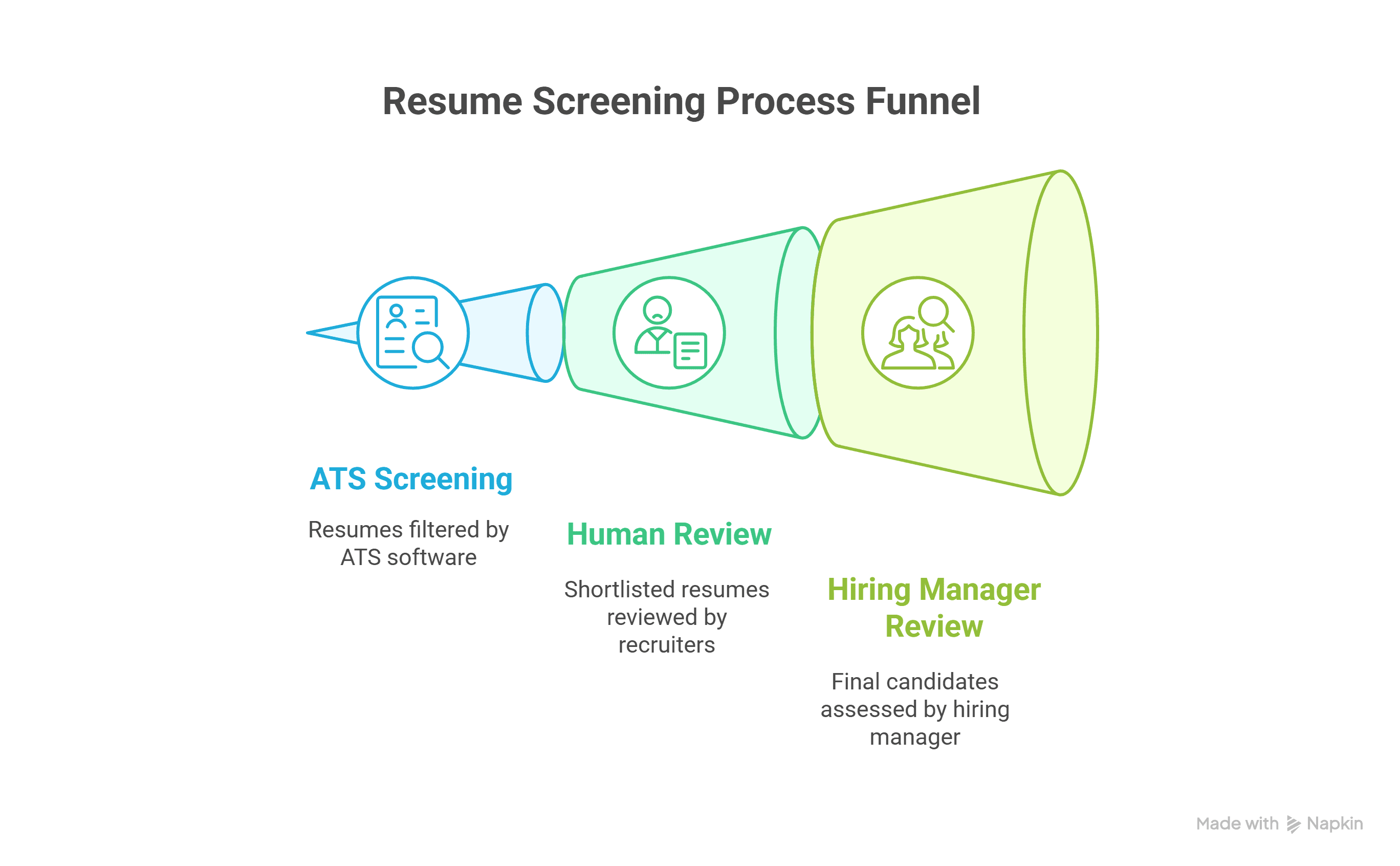
Let us be honest with you – the hiring game has completely changed. As someone who's been in the trenches building companies, we've seen firsthand how overwhelming the modern recruitment landscape has become. With remote work becoming the norm and digital-first hiring processes, we're now drowning in 3-5x more applications per position than we saw just five years ago.
According to a study by Jobscan, over 98% of Fortune 500 companies use some form of recruiting or applicant tracking software to manage this tsunami of applications. Yet most of us are still struggling to keep our heads above water.
The brutal truth? While application volume has exploded, our HR teams haven't grown proportionally. The result is hiring managers burning themselves out manually screening resumes, missing incredible candidates buried in the pile, or worse, wasting precious interview time on people who aren't even close to being a fit.
Resume screening software isn't just a nice-to-have anymore – it's become as essential to modern recruiting as having a website is to modern business. In this guide, we'll walk you through the solutions that are actually working for companies like ours, helping you transform your hiring from reactive firefighting to strategic talent acquisition.
Why Resume Screening Software is Essential for Modern HR Teams
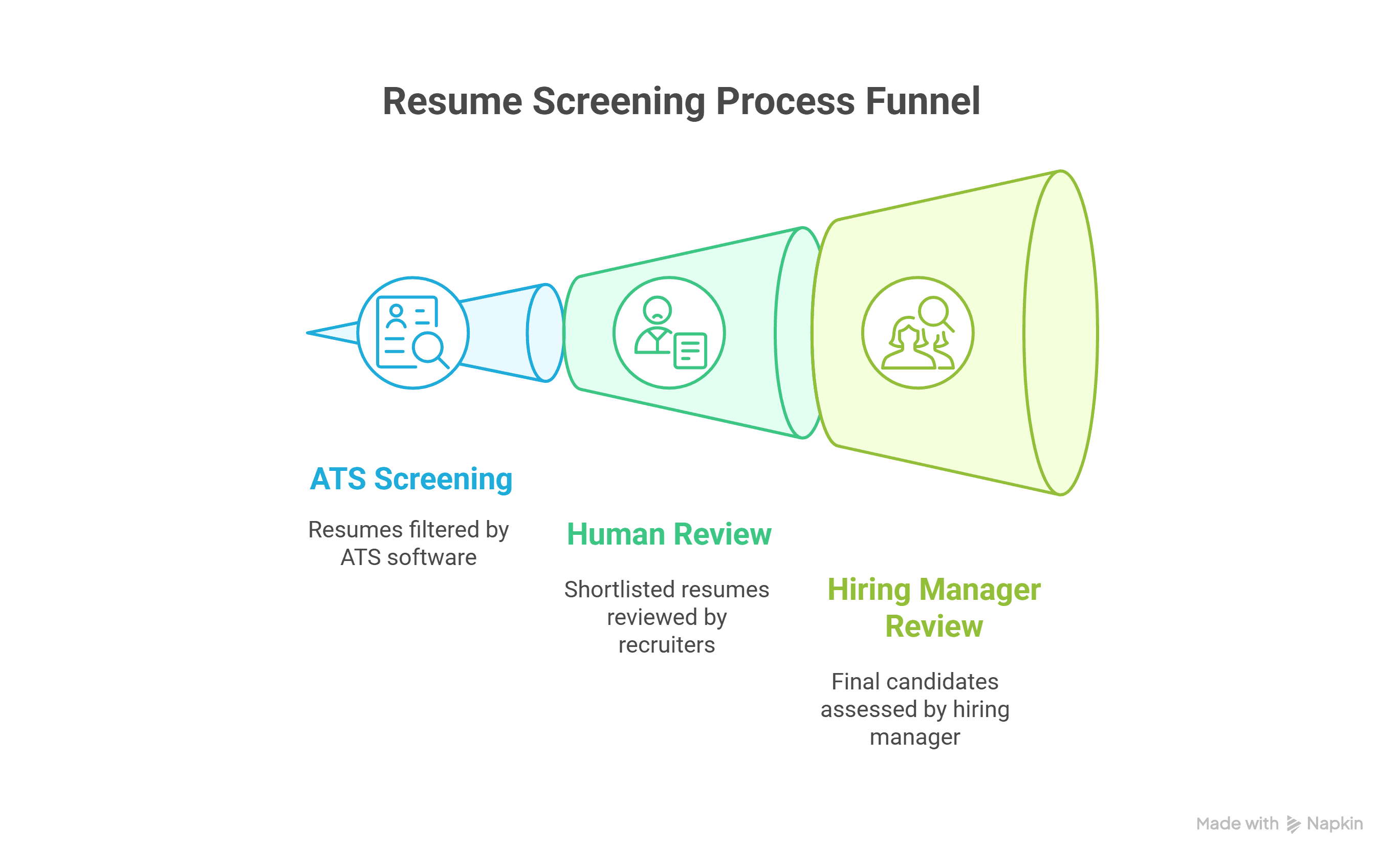
The Scale Challenge (And Why It's Getting Worse)
Let us paint you a picture of today's hiring reality. Research shows that the average job posting in the USA receives 250 resumes from hopeful candidates. For roles in tech, marketing, or any high-demand field? We're talking thousands.
Now here's the kicker – studies indicate that screening resumes and shortlisting candidates to interview takes 23 hours of a recruiter's time for a single hire. Meanwhile, data shows recruiters spend an average of 6-8 seconds reviewing each resume. That's barely enough time to read someone's name, let alone assess whether they're the right fit for your company culture.
The scale problem isn't just big – it's getting exponentially worse. Current statistics reveal that 75% of resumes are rejected by ATS software and never seen by a human eye. Even more sobering: research indicates that over 80% of resumes don't make it past the first screening, and only 1 in 10 get to a hiring manager.
This creates a massive bottleneck where qualified candidates get lost in the volume – and frankly, it's breaking our hiring processes.
Key Benefits of Automated Resume Screening
1. Time Efficiency at Scale Modern resume screening software can process hundreds of applications in minutes, not hours. When you consider that screening and shortlisting takes 23 hours per hire, automation becomes absolutely critical for any growing business.
2. Consistency and Bias Reduction Automated systems apply the same screening criteria to every single candidate. Research shows that 68% of recruiters believe AI could remove biases from hiring processes. This consistency is game-changing for companies serious about diversity and inclusion.
3. Enhanced Candidate Experience This might surprise you, but automation actually improves candidate experience. Studies demonstrate that automated chatbots can promptly address candidate queries, while AI-driven platforms offer tailored job recommendations. Faster response times and consistent communication create a professional impression that strengthens your employer brand.
4. Cost Reduction and ROI Let's talk numbers. Industry data shows that AI recruitment can reduce hiring costs by 30% per hire and increase revenue per employee by an average of 4%. For a growing company, these savings add up fast.
5. Improved Quality of Hire Here's what really excites me: companies that have adopted AI for recruiting have seen their performance increase by 20%, revenue per employee improve by 4%, and turnover decrease by 35%. Those aren't just impressive numbers – they're business-changing metrics.
6. Enhanced Productivity
LinkedIn research indicates that 74% of respondents believe generative AI helps automate repetitive tasks, allowing recruiters to focus on strategic work. This shift lets your HR team focus on what humans do best: building relationships and assessing cultural fit.
Combining Resume Screening with Pre-Interview Assessments
Here's where most companies miss a huge opportunity: resume screening is just your first filter. This powerful approach enables you to:
- Quickly identify candidates with the right qualifications using resume screening tools
- Further evaluate shortlisted candidates' skills and aptitudes through targeted assessments
- Make more informed decisions about which candidates to invite for interviews
By implementing this three-step process, you can significantly improve the quality of your candidate pool and increase the likelihood of making successful hires.
Detailed Analysis: Top 5 Best Resume Screening Software Solutions
1. Hirevire
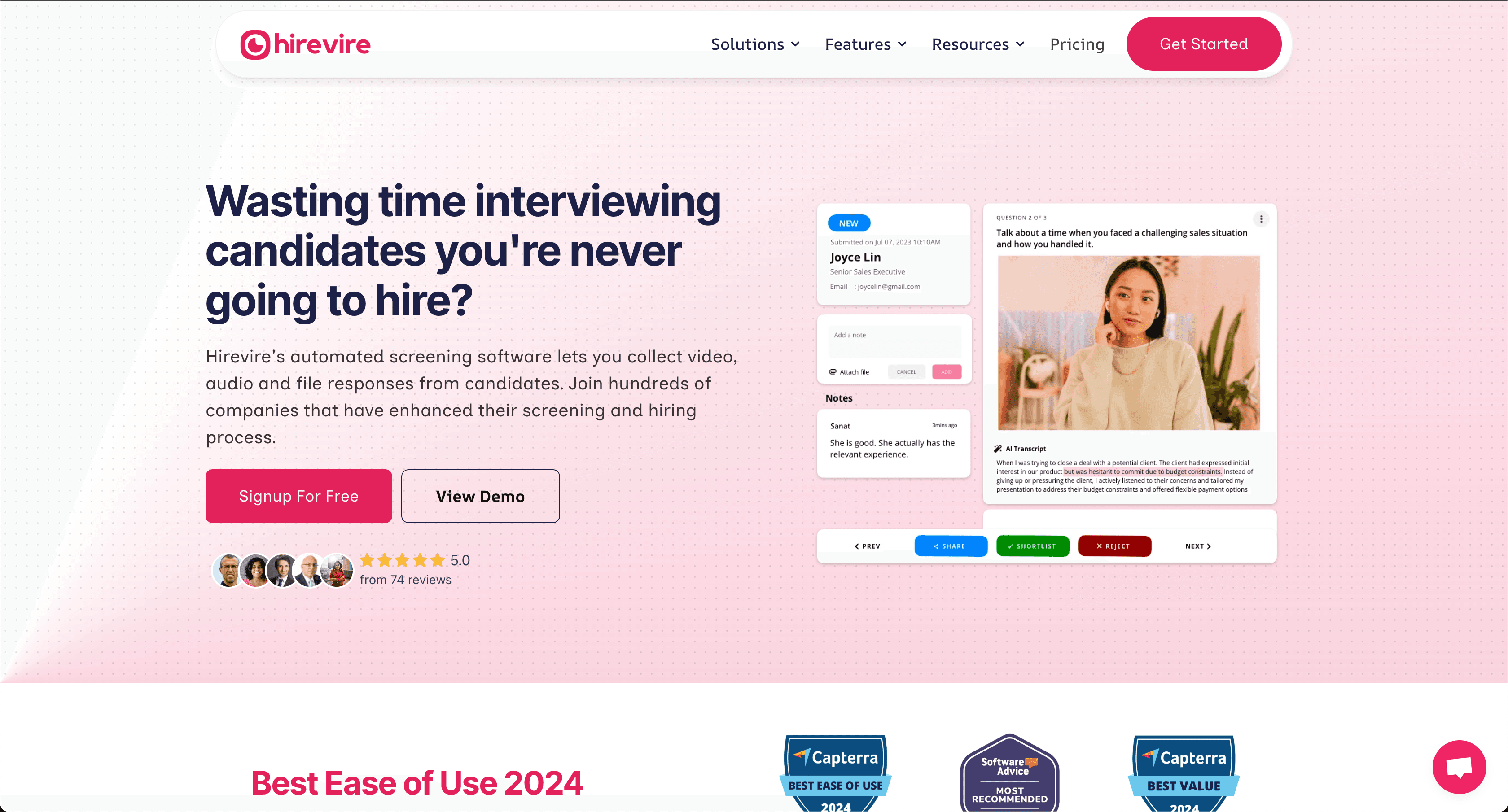
Quick Overview:
- Price: Starting at $19/month (annual billing)
- Best For: Growing companies (20-200 employees) needing comprehensive screening
- Key Strength: Only platform combining resume screening with advanced video assessment
- Market Position: Most affordable all-in-one solution with enterprise-grade features
Description:
Hirevire represents a paradigm shift in recruitment screening by being the only platform that truly integrates resume analysis with comprehensive video, audio, and file-based candidate assessments. While most screening tools force you to choose between resume filtering OR video interviews, HireVire eliminates this false choice by providing both capabilities in a single, streamlined platform.
What makes Hirevire particularly compelling is our focus on the complete candidate picture. Traditional resume screening only tells you if someone looks good on paper, but Hirevire goes deeper, revealing communication skills, personality traits, and cultural fit through video responses while maintaining the efficiency of automated resume analysis.
Unlike competitors that bolt on video features as afterthoughts, Hirevire was built from the ground up to seamlessly blend resume intelligence with human assessment, creating a more complete and accurate evaluation process that saves time while improving hiring quality.
Key Features:
- Multi-format Response Collection - Video, audio, rich text, and file submissions all processed through one workflow
- AI-Powered Transcription - Automatic transcripts in 90+ languages with sentiment analysis and keyword detection
- Advanced Analytics Dashboard - Track application trends, candidate quality metrics, and hiring funnel performance over time
- Seamless Integrations - Native connections to major ATS platforms plus 5000+ apps via Zapier and Make
- Custom Branding - Complete white-label experience with company logos, colors, and custom domain support
- No-Login Candidate Experience - Frictionless application process requiring no account creation or downloads
- Automated Email Workflows - Customizable communication sequences for different candidate stages
- Bulk Candidate Management - Mass invite capabilities and CSV export for large-scale hiring initiatives
Pricing:
Hirevire follows a transparent, flat-rate pricing model starting at $19/month (annual billing) that includes unlimited candidate responses and all core features. This pricing approach eliminates the per-candidate fees and usage limitations that make other platforms expensive at scale.
Our pricing philosophy reflects Hirevire's commitment to making advanced screening accessible to growing companies rather than just enterprise organizations. Higher-tier plans ($49 and $99/month) add features like advanced analytics, priority support, and additional integrations, but the core screening functionality remains fully accessible at the entry level.
Pros:
- Unmatched value proposition - Comprehensive screening capabilities at a fraction of enterprise solution costs
- Exceptional candidate experience - No login barriers, mobile-optimized, and intuitive interface that candidates actually enjoy using
- Rapid implementation - Most customers are fully operational within 24-48 hours without technical support
- Outstanding customer support - Real humans provide assistance with typical response times under 2 hours during business hours
- Genuine all-in-one solution - Eliminates need for separate resume screening and video interview tools
- Proven scalability - Successfully handles everything from 10 applications to 10,000+ without performance degradation
Cons:
- Newer market presence - Founded more recently than established players, though growing rapidly with 500+ companies
- AI sophistication - Advanced machine learning features still developing compared to AI-specialized platforms
- Enterprise compliance - May require additional security reviews for large corporations with strict compliance requirements
Reviews:
- G2 rating: 4.8 out of 5 stars
- Capterra: 5.0 stars
- Trustpilot: 4.5 out of 5 stars
Real User Testimonial:
"Hirevire completely transformed our hiring process. We went from spending 20+ hours per week on initial screening calls to reviewing candidates on our own schedule. The video responses give us so much more insight than resumes alone – we can see communication skills, enthusiasm, and cultural fit before investing time in interviews. The ROI was immediate; we calculated savings of $2,400 per month just in recruiter time, and our quality of hire improved dramatically because we're making better-informed decisions." - Sarah M., HR Manager at TechStartup (85 employees)
Target Users:
Growing companies, startups, and mid-market organizations represent Hirevire's sweet spot. HR managers and talent acquisition teams at companies with 20-200 employees who need to scale their hiring without proportionally scaling their HR headcount find Hirevire's comprehensive approach particularly valuable.
The platform is especially suitable for companies where cultural fit and communication skills matter as much as technical qualifications – such as customer success teams, sales organizations, management roles, and client-facing positions.
Best For:
Organizations requiring a complete screening solution that evaluates both resume qualifications and human factors like communication skills, personality, and cultural alignment. Companies tired of choosing between efficiency and insight will find Hirevire's integrated approach transformational for their hiring outcomes.
If your current screening process involves either time-consuming phone calls or impersonal resume-only filtering, Hirevire's combination approach could significantly improve both efficiency and hiring quality while maintaining the human connection that leads to better long-term employee success.
2. TestGorilla
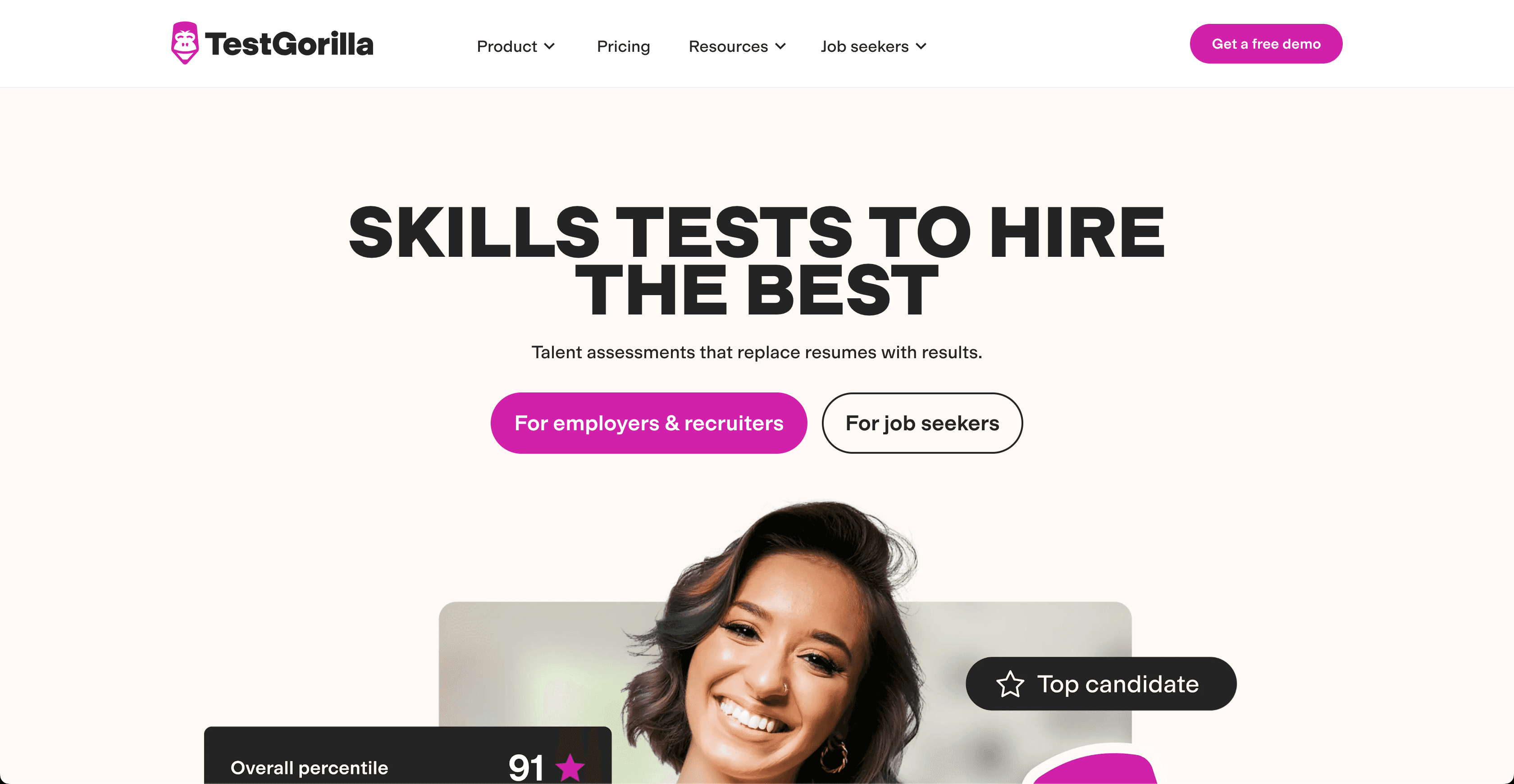
Quick Overview:
- Price: Starting at $85/month for teams (up to 15 users)
- Best For: Companies prioritizing skills over credentials
- Key Strength: Largest library of validated skills assessments (400+ tests)
- Market Position: Leading skills-based hiring platform with strong anti-bias focus
Description:
TestGorilla revolutionizes traditional hiring by fundamentally shifting focus from "what you've done" (resume credentials) to "what you can do" (actual skills demonstration). This skills-first approach represents a growing movement in modern hiring, particularly valuable for companies looking to reduce credential bias and tap into non-traditional talent pools.
What distinguishes TestGorilla is its scientific approach to assessment creation. Each test undergoes rigorous validation processes, ensuring it actually predicts job performance rather than just measuring theoretical knowledge. This attention to psychometric validity sets them apart from platforms offering generic questionnaires.
The platform emerged from research showing that traditional resume screening systematically excludes qualified candidates who lack conventional credentials but possess the actual skills needed for success. Companies using TestGorilla often discover high-performing employees they would have overlooked in traditional hiring processes.
Unlike resume screening tools that analyze past experience, TestGorilla evaluates present capabilities through practical demonstrations, making it particularly valuable for roles where skills matter more than pedigree.
Key Features:
- Extensive Validated Test Library - 400+ scientifically-designed assessments covering cognitive ability, personality, and job-specific skills
- Custom Assessment Creation - Build proprietary tests tailored to specific roles and company requirements
- Advanced Anti-Cheating Technology - Multiple proctoring methods and plagiarism detection ensure assessment integrity
- Comprehensive Candidate Reports - Detailed performance analytics with percentile rankings and competency breakdowns
- Video Question Integration - Combine skills tests with personality assessment through video responses
- ATS Integration - Seamless data flow with popular applicant tracking systems
- Bias Reduction Features - Anonymous testing options and structured evaluation criteria minimize unconscious bias
- Mobile-Optimized Testing - Candidates can complete assessments on any device without downloads
Pricing:
TestGorilla employs a user-based pricing model starting at $85/month for teams up to 15 users, with higher tiers offering additional features and larger team support. The pricing reflects the platform's comprehensive test library and sophisticated assessment technology.
While more expensive than basic screening solutions, the investment often pays for itself through improved hiring quality and reduced turnover costs. Enterprise packages offer volume discounts and custom features for larger organizations.
Pros:
- Scientifically validated assessments - Tests undergo rigorous psychometric validation to ensure they predict job performance
- Comprehensive skills coverage - Extensive library spans technical skills, soft skills, cognitive abilities, and industry-specific competencies
- Strong bias reduction - Skills-based approach reduces credential bias and promotes diversity in hiring
- Excellent candidate experience - Well-designed interface and mobile optimization create positive impression
- Detailed reporting - Rich analytics help hiring managers make data-driven decisions
- Proven ROI - Many customers report significant improvements in hiring quality and employee retention
Cons:
- Higher cost structure - More expensive than basic resume screening tools, especially for smaller teams
- Limited resume analysis - Focuses on skills assessment rather than traditional resume screening
- Assessment fatigue risk - Comprehensive testing may deter some candidates if not balanced properly
- Setup complexity - Requires thoughtful test selection and configuration for optimal results
Reviews & Ratings
- G2 rating: 4.5 out of 5 stars
- Capterra: 4.2 stars
Real User Testimonial:
"TestGorilla helped us identify candidates we would have missed based on resumes alone. A candidate without a college degree outperformed MBA graduates on our marketing assessment and became one of our top performers. The platform helped us realize that skills matter more than credentials, and our diversity metrics improved significantly while maintaining quality standards." - Mike R., Talent Acquisition Manager at Growth Corp (150 employees)
Target Users:
HR teams and hiring managers prioritizing skills over traditional credentials represent TestGorilla's core market. Companies implementing skills-based hiring initiatives, reducing degree requirements, or seeking to improve diversity through competency-focused evaluation find the platform particularly valuable.
Organizations in rapidly evolving fields where practical skills matter more than formal education – such as digital marketing, software development, and creative industries – benefit most from TestGorilla's approach.
Best For:
Skills-based hiring initiatives, roles where practical competencies outweigh credentials, and organizations committed to reducing bias through objective assessment. Companies struggling with credential inflation or seeking to tap into non-traditional talent pools will find TestGorilla's skills-first approach transformational.
If your hiring process currently overemphasizes degrees and certificates while undervaluing actual capabilities, TestGorilla's comprehensive assessment platform could significantly improve both hiring quality and workforce diversity.
3. HireHunch
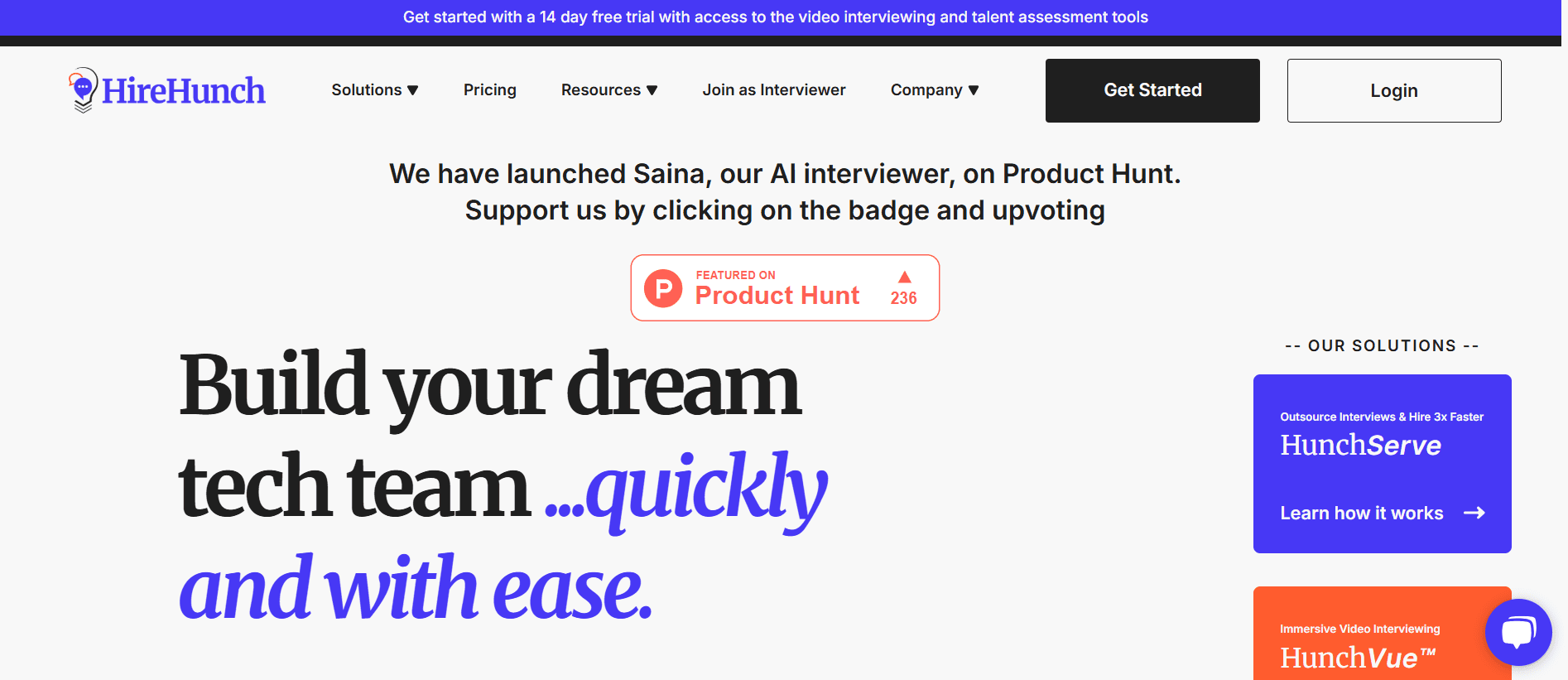
Quick Overview:
- Price: Starting at $99/month for teams
- Best For: Mid-to-large companies with high-volume hiring needs
- Key Strength: Sophisticated AI algorithms with bias reduction focus
- Market Position: Premium AI-driven resume analysis with enterprise features
Description:
HireHunch represents the cutting edge of artificial intelligence applied specifically to resume screening and candidate matching. The platform leverages advanced natural language processing and machine learning algorithms to parse, analyze, and rank resumes with unprecedented accuracy and sophistication.
What sets HireHunch apart is its commitment to explainable AI – the system doesn't just provide candidate scores, but explains the reasoning behind its recommendations. This transparency is crucial for hiring managers who need to understand and justify AI-driven hiring decisions to stakeholders and candidates.
The platform emerged from recognition that traditional keyword-based resume screening misses qualified candidates and perpetuates hiring biases. HireHunch's AI models are specifically trained to identify relevant skills and experience patterns while actively working to reduce demographic and credential bias.
Unlike basic resume filtering tools that rely on simple keyword matching, HireHunch uses contextual understanding to evaluate candidate qualifications, making it particularly effective for complex roles where traditional screening methods fall short.
Key Features:
- Advanced Natural Language Processing - Sophisticated AI models parse and understand resume content beyond simple keyword matching
- Bias Detection and Mitigation - Active algorithms identify and reduce various forms of hiring bias throughout the screening process
- Customizable Scoring Algorithms - Tailored ranking systems that can be adjusted for different roles, seniority levels, and company priorities
- Enterprise ATS Integration - Seamless connection with major applicant tracking systems including Workday, SuccessFactors, and Greenhouse
- Detailed Analytics Dashboard - Comprehensive reporting on screening performance, candidate quality trends, and bias metrics
- Bulk Processing Capabilities - Efficiently handle high-volume screening scenarios with automated candidate ranking
- Explainable AI Reports - Detailed reasoning behind AI recommendations for transparency and decision justification
- Custom Model Training - AI algorithms adapt and improve based on your specific hiring patterns and successful placements
Pricing:
HireHunch follows a tiered pricing model starting at $99/month for teams, with enterprise packages offering additional features and higher processing volumes. The pricing reflects the sophisticated AI technology and enterprise-grade features included in the platform.
Custom pricing is available for large organizations with specific integration requirements or high-volume processing needs. While more expensive than basic screening tools, the investment typically pays for itself through improved screening accuracy and reduced time-to-hire.
Pros:
- Sophisticated AI analysis - Advanced algorithms provide nuanced understanding of candidate qualifications beyond keyword matching
- Strong bias reduction focus - Active measures to identify and mitigate various forms of hiring bias throughout the process
- Excellent enterprise integration - Seamless connection with major ATS platforms and enterprise HR systems
- Detailed analytics and reporting - Comprehensive insights into screening performance and hiring trends
- Scalable for high-volume hiring - Efficiently processes large candidate pools without performance degradation
- Explainable AI transparency - Clear reasoning behind AI recommendations builds trust and supports decision-making
Cons:
- Higher learning curve - Advanced features require time and training to implement effectively
- Significant setup requirements - Requires substantial data and configuration to train AI models effectively
- No video screening capabilities - Focuses exclusively on resume analysis without additional assessment methods
- Premium pricing - More expensive than basic screening solutions, potentially limiting accessibility for smaller organizations
Reviews & Ratings:
- G2 rating: 4.6 out of 5 stars
- Capterra: 4.8 stars
Real User Testimonial:
"HireHunch's AI helped us identify bias patterns in our screening we didn't even know existed. Our diverse hiring improved by 40% while maintaining quality standards. The explainable AI feature was crucial for getting buy-in from hiring managers who were initially skeptical of algorithmic screening. Now they trust the recommendations because they understand the reasoning behind them." - Jennifer L., VP of People Operations at MidSize Tech (400 employees)
Target Users:
Mid-to-large companies with dedicated HR teams and high-volume hiring needs represent HireHunch's primary market. Organizations with 200+ employees who process hundreds of applications monthly and have the resources to properly implement and optimize AI-driven screening find the platform most valuable.
Companies with strong diversity and inclusion initiatives or those facing regulatory requirements around fair hiring practices particularly benefit from HireHunch's bias reduction capabilities.
Best For:
High-volume hiring scenarios, enterprise organizations with sophisticated HR needs, and companies prioritizing bias reduction through AI-driven screening. Organizations that need detailed analytics and reporting on their hiring processes will find HireHunch's comprehensive approach valuable.
If your current screening process struggles with consistency, bias, or handling large candidate volumes while maintaining quality, HireHunch's AI-powered approach could significantly improve both efficiency and fairness in your hiring decisions.
4. Adaface
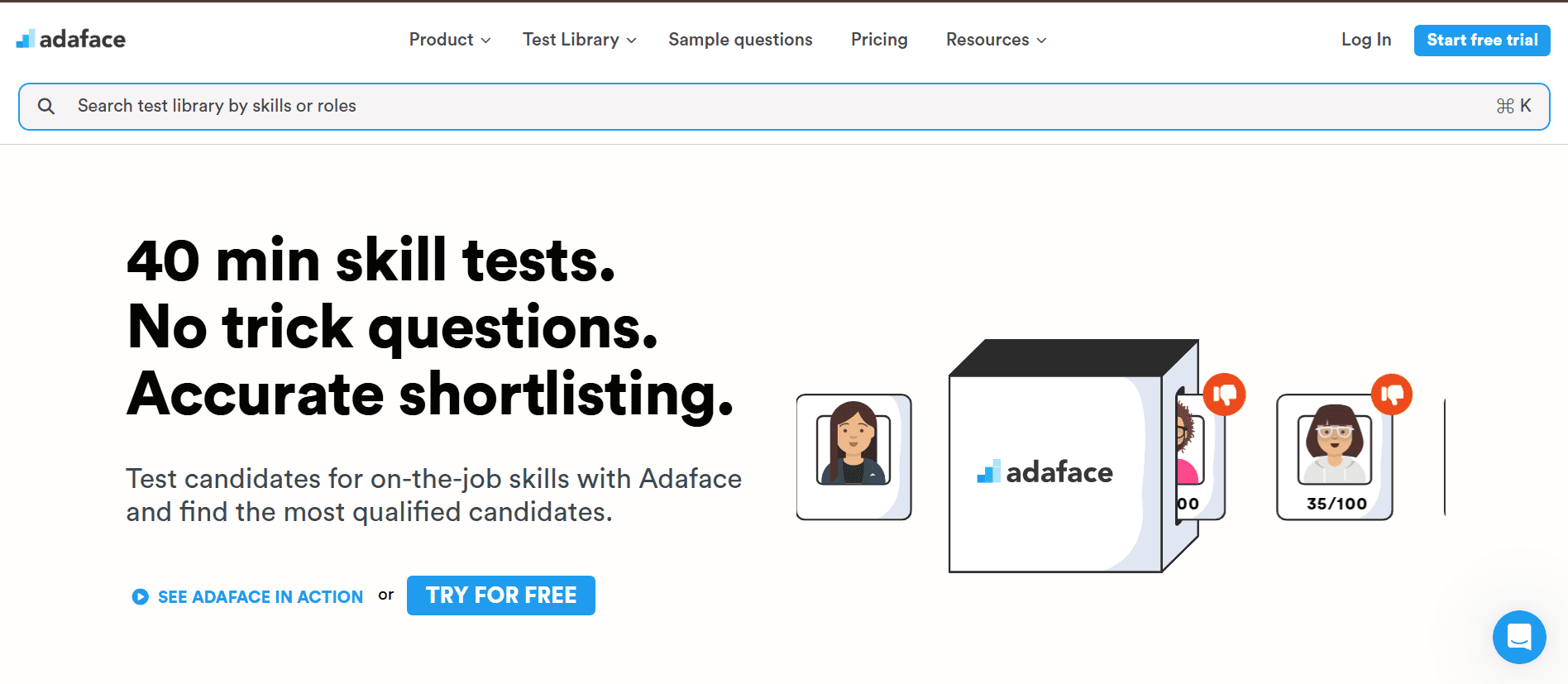
Quick Overview:
- Price: Starting at $300/month for teams
- Best For: Technology companies with intensive technical hiring needs
- Key Strength: Most comprehensive technical assessment library (500+ tests)
- Market Position: Premium technical screening platform with real-world focus
Description:
Adaface represents the gold standard for technical talent assessment, purpose-built for evaluating complex engineering and development roles through practical, real-world scenarios rather than theoretical knowledge tests. The platform recognizes that traditional screening methods fail to accurately assess technical capabilities, leading to poor hiring decisions in critical roles.
What distinguishes Adaface is their commitment to practical assessment – instead of abstract coding puzzles, candidates work on realistic problems that mirror actual job responsibilities. This approach provides more accurate evaluation of how candidates will perform in real work situations.
The platform emerged from frustration with technical interviews that test algorithm knowledge rather than practical problem-solving abilities. Adaface's assessments focus on skills that matter in day-to-day work: code quality, debugging capabilities, system design thinking, and collaborative problem-solving.
Unlike general-purpose screening tools that add technical features as afterthoughts, Adaface was built exclusively for technical evaluation, incorporating deep understanding of software development practices and engineering methodologies.
Key Features:
- 500+ Technical Assessments - Comprehensive library covering all major programming languages, frameworks, and technical disciplines
- Real-World Problem Scenarios - Practical coding challenges that mirror actual job tasks rather than abstract algorithms
- Live Coding Environments - Interactive coding interviews with real-time collaboration and code review capabilities
- Advanced Plagiarism Detection - Sophisticated anti-cheating measures, including code similarity analysis and proctoring
- Expert Technical Interviewer Network - Access to experienced technical professionals for specialized assessment needs
- Custom Coding Challenge Creation - Build role-specific technical assessments tailored to your technology stack
- Comprehensive Skill Coverage - Assessments span front-end, back-end, mobile, DevOps, data science, and emerging technologies
- Detailed Performance Analytics - In-depth reporting on coding quality, problem-solving approach, and technical reasoning
Pricing:
Adaface employs a premium pricing model starting at $300/month for teams, reflecting the sophisticated technical assessment capabilities and expert interviewer network. Enterprise packages offer volume discounts and additional features like dedicated support and custom integration development.
While expensive compared to general screening solutions, the investment typically delivers strong ROI through improved technical hiring quality and reduced bad hire costs, which can be extremely expensive in technical roles.
Pros:
- Exceptional technical assessment depth - Most comprehensive technical evaluation platform available with realistic, job-relevant challenges
- Real-world problem focus - Practical scenarios provide an accurate prediction of actual job performance
- Strong anti-cheating measures - Sophisticated plagiarism detection and proctoring ensure assessment integrity
- Expert interviewer network - Access to specialized technical professionals for complex evaluation needs
- Comprehensive technology coverage - Assessments available for virtually all programming languages and technical disciplines
- High-quality candidate experience - Well-designed technical challenges that candidates find engaging rather than frustrating
Cons:
- Premium pricing structure - Significantly more expensive than general screening solutions, potentially limiting accessibility
- Technical role limitation - Exclusively focused on technical positions, unsuitable for non-technical hiring needs
- Implementation complexity - Requires technical expertise to set up and optimize effectively
- Learning curve for HR teams - Advanced features may overwhelm non-technical recruiting professionals
Reviews & Ratings of Adaface
- G2 rating: 4.6 out of 5 stars
- Capterra: 4.7 stars
Real User Testimonial:
"Adaface completely transformed our technical hiring process. We went from 6-hour on-site technical interviews to 2-hour focused sessions because candidates were already thoroughly pre-qualified. Our engineering team loves the quality of candidates we're seeing – they arrive with demonstrated problem-solving skills rather than just theoretical knowledge. The reduction in bad technical hires alone justified the investment within three months." - David K., Engineering Manager at DevTech Solutions (200 engineers)
Target Users:
Technology companies, engineering teams, and organizations with significant technical hiring needs represent Adaface's core market. Companies hiring software engineers, data scientists, DevOps engineers, mobile developers, and other specialized technical roles find the platform's depth particularly valuable.
Organizations where technical excellence is critical and the cost of bad technical hires is extremely high, such as fintech startups, AI companies, and established tech firms scaling engineering teams, benefit most from Adaface's comprehensive approach.
Best For:
Software engineering roles, technical positions requiring coding proficiency, companies hiring developers at scale, and organizations that need deep technical evaluation capabilities. Teams struggling with accurately assessing coding skills, system design thinking, or technical problem-solving approaches will find Adaface's specialized platform transformational.
If your technical hiring process currently relies on generic coding tests or lengthy on-site interviews that fail to predict actual job performance, Adaface's real-world assessment approach could significantly improve both hiring efficiency and technical team quality.
5. TalView
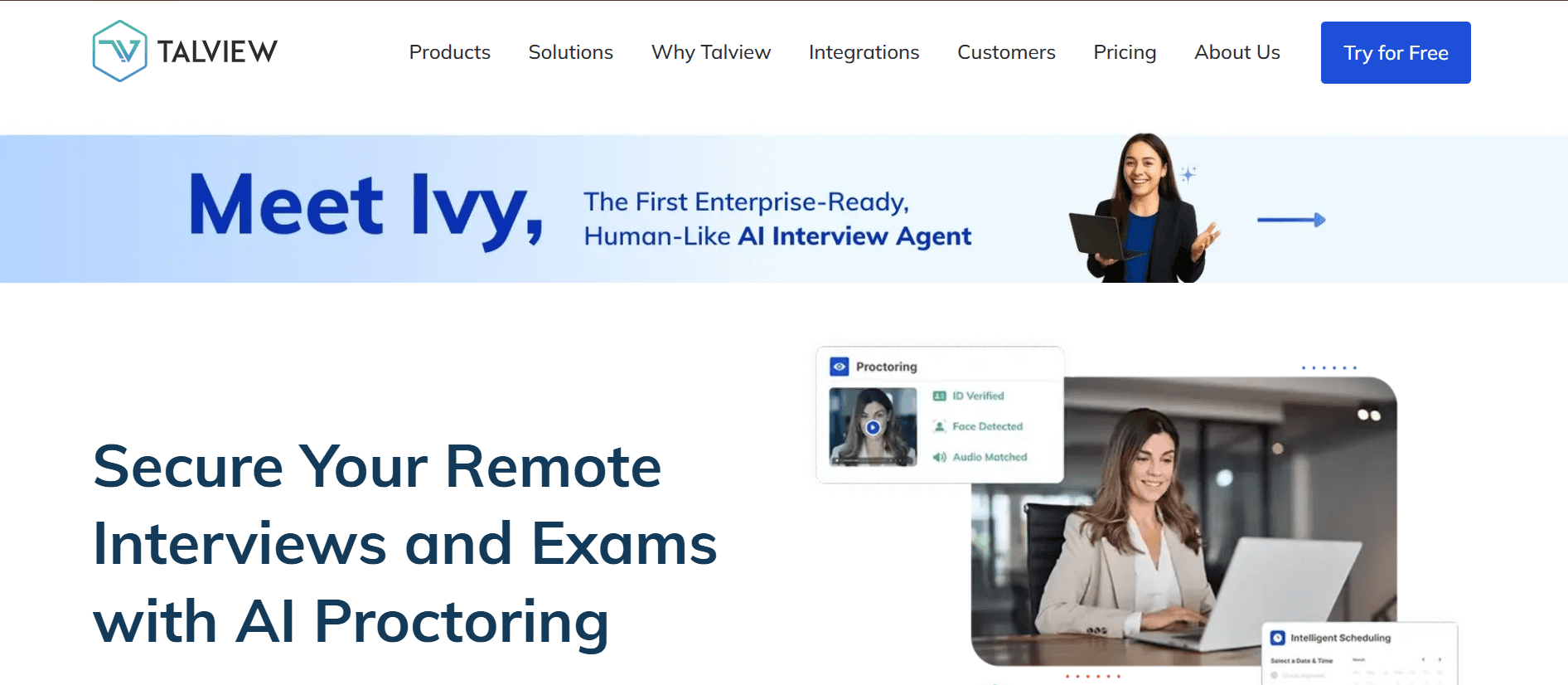
Quick Overview:
- Price: Custom enterprise pricing (typically $10,000+ annually)
- Best For: Large enterprises with complex compliance requirements
- Key Strength: Enterprise-grade security and global deployment capabilities
- Market Position: Premium enterprise solution with comprehensive compliance features
Description:
TalView represents the enterprise-grade solution for organizations requiring sophisticated video interviewing and screening capabilities at global scale with stringent security and compliance requirements. The platform was built specifically for large organizations that need to maintain consistent hiring standards across multiple countries, departments, and regulatory environments.
What sets TalView apart is their comprehensive approach to enterprise needs – not just video interviewing, but complete workflow management, advanced analytics, compliance reporting, and integration with complex enterprise systems. The platform handles the unique challenges that large organizations face in hiring at scale.
TalView emerged from recognition that most screening solutions are built for small to medium companies and fail when deployed in enterprise environments with thousands of users, complex approval workflows, and strict compliance requirements. The platform addresses these challenges through enterprise-grade architecture and dedicated implementation support.
Unlike smaller platforms that struggle with enterprise deployment, TalView was designed from the ground up for large-scale, multi-national implementation with features like SOC 2 compliance, advanced security controls, and comprehensive audit trails.
Key Features:
- Enterprise-Grade Security Architecture - SOC 2 Type II compliance, advanced encryption, and comprehensive audit trails
- Advanced AI-Powered Proctoring - Sophisticated monitoring and assessment integrity measures for high-stakes hiring
- Global Multi-Language Support - Comprehensive localization for international hiring across diverse markets
- Comprehensive Analytics and Reporting - Enterprise-level dashboards with detailed hiring metrics and compliance reporting
- Complete White-Labeling Capabilities - Full customization options for brand consistency across all candidate touchpoints
- Extensive Enterprise Integration Suite - Seamless connection with major enterprise systems including Workday, SAP, and Oracle
- Advanced Workflow Management - Complex approval processes and routing for large organizational structures
- Dedicated Implementation Support - Full-service deployment with ongoing enterprise account management
Pricing:
TalView follows a custom enterprise pricing model that typically starts at $10,000+ annually, with costs scaling based on organization size, feature requirements, and implementation complexity. The pricing reflects the comprehensive enterprise features and dedicated support included.
While expensive, the platform often delivers strong ROI for large organizations through improved hiring efficiency, reduced compliance risk, and standardized global hiring processes that can save millions in operational costs.
Pros:
- Comprehensive enterprise security - SOC 2 compliance and advanced security features meet stringent corporate requirements
- Exceptional scalability - Successfully handles global deployment with thousands of users without performance issues
- Advanced compliance features - Comprehensive audit trails and reporting support regulatory requirements
- Excellent for global hiring - Multi-language support and localization enable consistent international hiring
- Dedicated enterprise support - Full-service implementation and ongoing account management
- Complete customization options - Extensive white-labeling and workflow customization capabilities
Cons:
- Very high cost structure - Enterprise-only pricing excludes small to medium businesses
- Complex implementation process - Requires significant IT resources and extended deployment timelines
- Overkill for smaller organizations - Advanced features may be unnecessary for companies with simpler hiring needs
- Long sales and setup cycles - Enterprise sales process can take months before implementation begins
Reviews & Ratings of TalView:
- g2: 4.5 out of 5
- Capterra: 4.4 out of 5
Real User Testimonial:
"TalView handles our global hiring across 15 countries with consistent quality and compliance. The security features meet our stringent financial services requirements, and the analytics help us optimize our hiring funnel continuously. While the implementation was complex, the platform now saves us millions annually in hiring operational costs and ensures consistent candidate experience worldwide." - Maria S., Global Talent Acquisition Director at Fortune 500 Financial Services (50,000+ employees)
Target Users:
Large enterprises, multinational corporations, and organizations with complex compliance requirements represent TalView's exclusive market. Companies with 1,000+ employees, global hiring needs, and strict regulatory requirements find the platform's comprehensive enterprise features essential.
Organizations in highly regulated industries like financial services, healthcare, and government contracting that require extensive audit trails and compliance reporting benefit most from TalView's enterprise-focused approach.
Best For:
Enterprise organizations with high-volume global hiring, companies with strict security and compliance requirements, and multinational corporations needing standardized hiring processes across diverse markets. Organizations that require extensive customization, integration with complex enterprise systems, and dedicated implementation support will find TalView's comprehensive approach valuable.
If your organization currently struggles with inconsistent hiring processes across multiple locations, compliance challenges, or security concerns with existing screening solutions, TalView's enterprise-grade platform could provide the standardization and control needed for large-scale hiring success. security requirements, global hiring initiatives, and organizations needing comprehensive compliance reporting.
Comprehensive Comparison: Top 5 Resume Screening Software Solutions
| Software | Starting Price | Video Screening | ATS Integration | AI Analysis | G2 Rating | Best For | Free Trial |
|---|---|---|---|---|---|---|---|
| Hirevire | $39/month | ✅ Advanced | ✅ Zapier + Native | ✅ Transcripts + Analytics | 4.8/5 | Growing companies needing video + resume screening | ✅ 14 days |
| TestGorilla | $85/month | ❌ | ✅ Limited | ✅ Skills assessment focus | 4.5/5 | Skills-based hiring | ✅ 30 days |
| HireHunch | $99/month | ❌ | ✅ Major ATS | ✅ Advanced AI screening | 4.6/5 | Enterprise resume filtering | ✅ 14 days |
| Adaface | $300/month | ❌ | ✅ Limited | ✅ Technical assessments | 4.6/5 | Technical role screening | ✅ 7 days |
| TalView | Custom pricing | ✅ Limited | ✅ Enterprise focus | ✅ Proctoring + AI | 4.5/5 | Large enterprise hiring | ❌ Demo only |
Choosing the Right Resume Screening Software: Key Considerations
1. Integration Capabilities
Your screening software should play nicely with your existing HR tech stack. Look for solutions offering:
- Native ATS integrations for your current system
- Zapier/Make connectivity for workflow automation
- HRIS synchronization for employee data management
- Calendar integration for interview scheduling
2. Scalability and Pricing Structure
Think about both your current needs and where you're headed:
- Per-user vs. flat-rate pricing - which makes more sense for your team structure?
- Candidate volume limits - can the platform handle your application flow during busy periods?
- Feature accessibility - are the features you actually need locked behind expensive enterprise tiers?
3. User Experience (Both Recruiter and Candidate)
The best software in the world is useless if your team won't use it. Evaluate:
- Recruiter interface complexity - can your team learn it without a PhD?
- Candidate experience quality - does it make your company look professional and caring?
- Mobile compatibility - can both sides use it effectively on their phones?
4. Advanced Features and AI Capabilities
Modern screening software should offer:
- Machine learning that improves over time with your data
- Bias detection and mitigation features
- Customizable scoring algorithms
- Predictive analytics for hiring success
Implementation Best Practices for Resume Screening Software
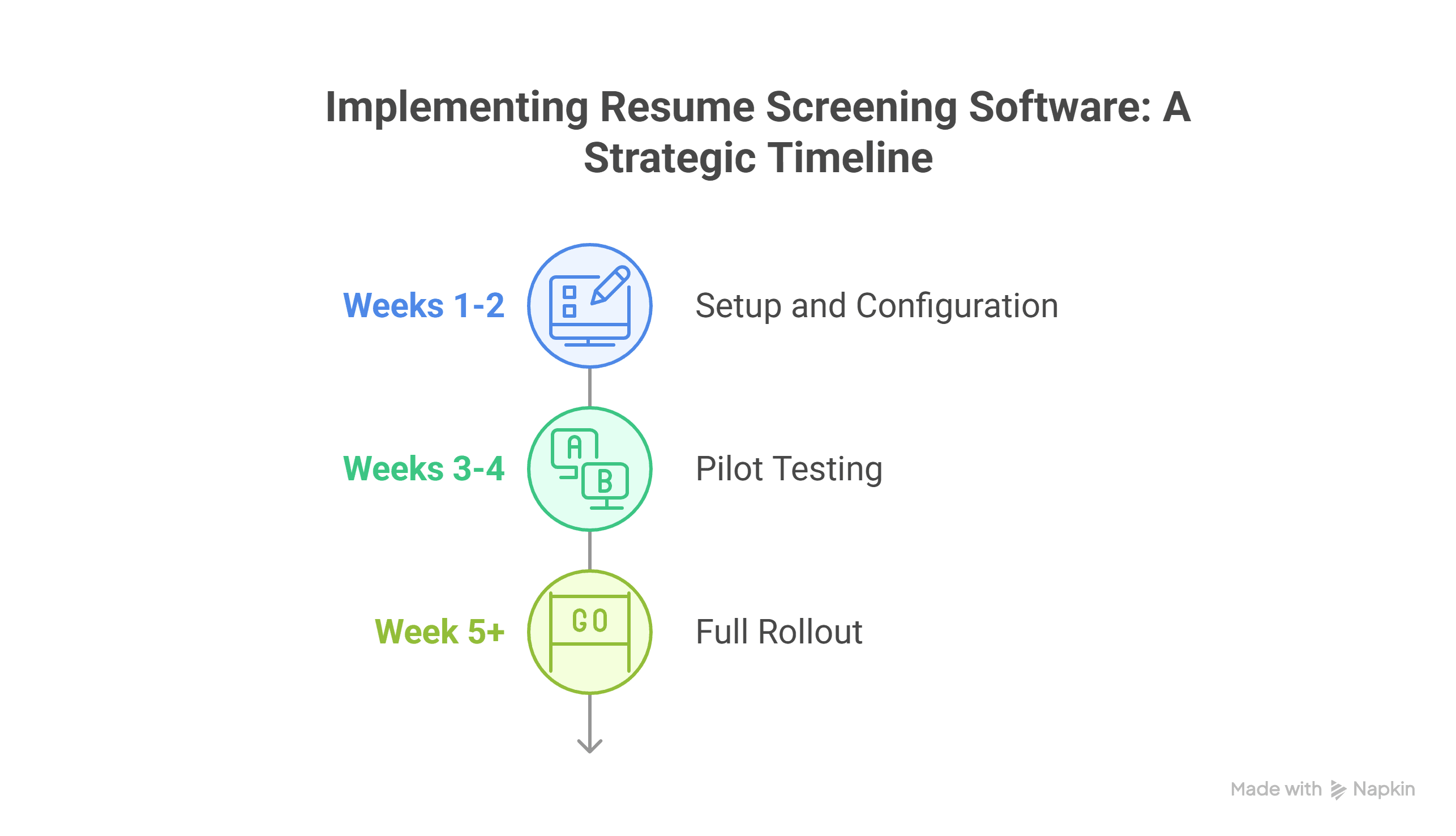
Phase 1: Setup and Configuration (Weeks 1-2)
Define Your Screening Criteria Work closely with your hiring managers to establish must-have vs. nice-to-have qualifications. Create role-specific screening templates, set up keyword lists and scoring algorithms, and configure integration with your existing ATS/HRIS.
Team Training and Onboarding Schedule platform training sessions for all users, create internal documentation and best practices, establish review processes for screening results, and set up candidate communication templates.
Phase 2: Pilot Testing (Weeks 3-4)
Start with Low-Stakes Positions Choose 2-3 non-critical open positions for initial testing. Run parallel processes (manual + automated) for comparison, gather feedback from recruiters and hiring managers, and monitor candidate experience and feedback.
Refine and Optimize Adjust screening criteria based on initial results, optimize keyword lists and scoring algorithms, refine candidate communication templates, and document lessons learned and process improvements.
Phase 3: Full Rollout (Week 5+)
Expand to All Open Positions Implement across all active job postings, monitor key metrics (time-to-hire, candidate quality, user satisfaction), continue gathering feedback and making adjustments, and track ROI and productivity improvements.
Industry Statistics and Trends
Current Market Landscape
The resume screening software market is exploding. Market Research Future data shows the global AI recruitment market is expected to reach $1.12 billion by 2030, with a compound annual growth rate of 64.45%.
Key Trend Insights:
- AI Adoption: Research shows 83% of companies plan to use AI for reviewing resumes in 2025
- Video Integration: Companies using video screening report 46% higher candidate engagement rates
- Mobile Optimization: 89% of job seekers expect mobile-friendly application processes
- Bias Reduction: Organizations prioritizing bias reduction in screening see 23% more diverse hires
ROI and Performance Metrics
Measurable Benefits Organizations Report:
- Time Savings: Average 15-20 hours per week reduction in manual screening
- Cost Reduction: Studies show 30% decrease in cost-per-hire through improved efficiency
- Quality Improvement: 25% increase in interview-to-hire conversion rates
- Candidate Experience: 35% improvement in candidate satisfaction scores
Future Predictions for 2025-2026
Industry experts predict several key developments:
- Enhanced AI Personalization: Screening algorithms becoming more sophisticated in matching personality and cultural fit
- Voice and Video Analysis: Advanced sentiment analysis and communication skill assessment
- Predictive Analytics: Better forecasting of candidate success and retention likelihood
- Integration Consolidation: More comprehensive platforms combining multiple screening methods
Frequently Asked Questions
What is resume screening software?
Resume screening software is an automated tool that analyzes job applications and resumes to identify qualified candidates based on predetermined criteria. These systems use AI, machine learning, and keyword analysis to filter applications, rank candidates, and streamline the initial hiring process.
How accurate is automated resume screening?
Modern resume screening software achieves 85-95% accuracy when properly configured. However, accuracy depends heavily on:
- Quality of initial setup and criteria definition
- Regular optimization based on hiring outcomes
- Integration with additional assessment methods (like video screening)
- Ongoing refinement of algorithms and keywords
The key is combining resume screening with human judgment and additional evaluation methods for optimal results.
What's the difference between resume screening software and ATS?
While there's overlap, these serve different primary functions:
Applicant Tracking System (ATS):
- Manages entire candidate lifecycle
- Stores candidate data and communication history
- Handles interview scheduling and offer management
- Provides reporting and compliance features
Resume Screening Software:
- Focuses specifically on initial candidate evaluation
- Advanced AI analysis of qualifications and fit
- Automated scoring and ranking capabilities
- Often integrates with ATS as a specialized component
Many modern solutions combine both capabilities, while others specialize in one area with strong integration capabilities.
What's the ROI of implementing resume screening software?
Organizations typically see ROI within 3-6 months through several measurable benefits:
Time Savings: 15-20 hours per week reduction in manual screening (valued at $750-1,500/week for mid-level recruiters) Improved Hire Quality: 25% increase in interview-to-hire conversion rates reduces overall recruitment costs Faster Time-to-Hire: 40% reduction in average hiring timeline improves productivity and reduces vacancy costs Reduced Turnover: Better initial screening leads to improved job fit and studies show 50% higher retention rates
For a company making 50 hires per year, the total annual value typically ranges from $50,000-150,000.
What are the best practices for resume screening?
Essential Best Practices:
- Define Clear Criteria: Work with hiring managers to establish specific, measurable qualifications
- Regular Optimization: Review and refine screening criteria based on actual hiring outcomes
- Combine Methods: Use resume screening as first filter, followed by skills assessments or video screening
- Monitor for Bias: Regularly audit results to ensure fair and diverse candidate selection
- Maintain Human Oversight: Always have qualified humans review automated recommendations
- Candidate Communication: Provide timely, personalized feedback to maintain positive employer brand
Conclusion: Making the Right Choice for Your Organization
Look, choosing the right resume screening software isn't just about buying a tool – it's about transforming how your company finds and attracts talent. The landscape offers powerful solutions for every organization size and hiring need, but the key is matching your specific requirements with the right platform capabilities.
For Growing Companies (20-200 employees): Hirevire offers the best combination of affordability, comprehensive features, and scalability. The integration of resume screening with video assessment provides maximum insight for the investment – and honestly, that's exactly why we built it this way.
For Skills-Focused Hiring: TestGorilla's extensive assessment library makes it ideal for roles where specific competencies matter more than traditional experience.
For High-Volume Enterprise Hiring: HireHunch and TalView provide the advanced AI and enterprise features needed to manage complex, large-scale recruitment operations.
For Technical Roles: Adaface's specialized technical assessments offer unmatched depth for developer and engineering positions.
Here's our final piece of advice: the most successful implementations combine automated resume screening with human judgment and additional assessment methods. Whether you choose a comprehensive platform like Hirevire or a specialized solution, the key is consistent optimization and alignment with your overall hiring strategy.
Remember, current data shows that 75% of modern recruiters now consider automated screening essential to their success. The question isn't whether you should implement resume screening software – it's which solution will help you build the team that takes your company to the next level.
Ready to transform your hiring process? Start with a free trial of your chosen platform and experience the efficiency gains that successful companies are already using to outcompete for top talent.
Looking for a complete screening solution that combines resume analysis with video assessment? Start your free Hirevire trial and see why growing companies choose our comprehensive platform for more efficient, effective hiring.